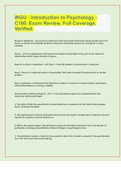Exam (elaborations)
WGU - Introduction to Psychology - C180. Exam Review, Full Coverage. Verified.
WGU - Introduction to Psychology - C180. Exam Review, Full Coverage. Verified. Research Hypothesis - -A precise statement of the presumed relationship among specific parts of a theory; A specific and falsifiable prediction about the relationship between or among two or more variables. Theo...
[Show more]



